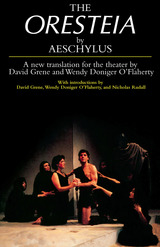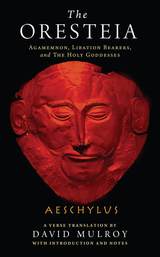
Three plays by ancient Greece’s third great tragedian.
One of antiquity's greatest poets, Euripides has been prized in every age for the pathos, terror, and intellectual probing of his dramatic creations. The new Loeb Classical Library edition of his plays is in six volumes.
Helen, in Volume V, employs an alternative history in which a virtuous and faithful Helen was falsely blamed for the actions of her divinely created double in Troy. Here too are Phoenician Women, the battle between the sons of Oedipus for control of Thebes; and Orestes, recasting Orestes' lot after he murdered his mother.


This drama of the House of Atreus catches everyone in a bloody net. Queen Clytaemestra of Argos murders her husband Agamemnon. Their son Orestes avenges his father by killing his mother. The Furies, hideous deities who punish the murder of blood kin, pursue Orestes. Into this horrific cycle steps Athena, goddess of wisdom, who establishes the rule of law to replace fatal vengeance. Orestes is tried in court before a jury of Athenians and found not guilty. Athena transforms the Furies into benevolent goddesses and extols the virtue of mercy.
An important historical document as well as gripping entertainment, the Oresteia conveys beliefs and values of the ancient Athenians as they established the world's first great democracy. Aeschylus (525/4–456/5 B.C.E.) was the first of the three great tragic dramatists of ancient Greece, forerunner of Sophocles and Euripides. In this trilogy he created a new dramatic form with characters and plot, infused with spellbinding emotion. David Mulroy's fluid, accessible English translation with its rhyming choral songs does full justice to the meaning and theatricality of the ancient Greek. In an introduction and appendixes, he provides cultural background for modern readers, actors, and students.

The tragic cycle of justice.
Aeschylus (ca. 525–456 BC), the dramatist who made Athenian tragedy one of the world’s great art forms, witnessed the establishment of democracy at Athens, fought against the Persians at Marathon and probably also at Salamis, and had one of his productions sponsored by the young Pericles. He was twice invited to visit Sicily, and it was there that he died. At Athens he competed for the tragic prize at the City Dionysia about nineteen times between circa 499 and 458, and won it on thirteen occasions; in his later years he was probably victorious almost every time he put on a production, though Sophocles beat him at least once.
Of his total of about eighty plays, seven survive complete. The first volume of this new Loeb Classical Library edition contains fresh texts and translations by Alan H. Sommerstein of Persians (472), on the recent war, the only surviving Greek historical drama; Seven against Thebes (467), the third play of a trilogy, on the conflict between Oedipus’ sons which ends when they kill each other; Suppliants, the first or second play of a trilogy, on the successful appeal by the daughters of Danaus to the king and people of Argos for protection against a forced marriage to their cousins (whom they will later murder, all but one); and Prometheus Bound (of disputed authenticity), on the terrible punishment of Prometheus for giving fire to humans in defiance of Zeus (with whom he will later be reconciled after preventing his overthrow). The second volume contains the complete Oresteia trilogy (458), comprising Agamemnon, Libation-Bearers, and Eumenides, presenting the murder of Agamemnon by his wife, the revenge taken by their son Orestes, the pursuit of Orestes by his mother’s avenging Furies, his trial and acquittal at Athens, Athena’s pacification of the Furies, and the blessings they both invoke upon the Athenian people.
This edition’s third volume offers all the major fragments of lost Aeschylean plays, with brief headnotes explaining what is known, or can be plausibly inferred, about their content, and bibliographies of recent studies.
READERS
Browse our collection.
PUBLISHERS
See BiblioVault's publisher services.
STUDENT SERVICES
Files for college accessibility offices.
UChicago Accessibility Resources
home | accessibility | search | about | contact us
BiblioVault ® 2001 - 2024
The University of Chicago Press









